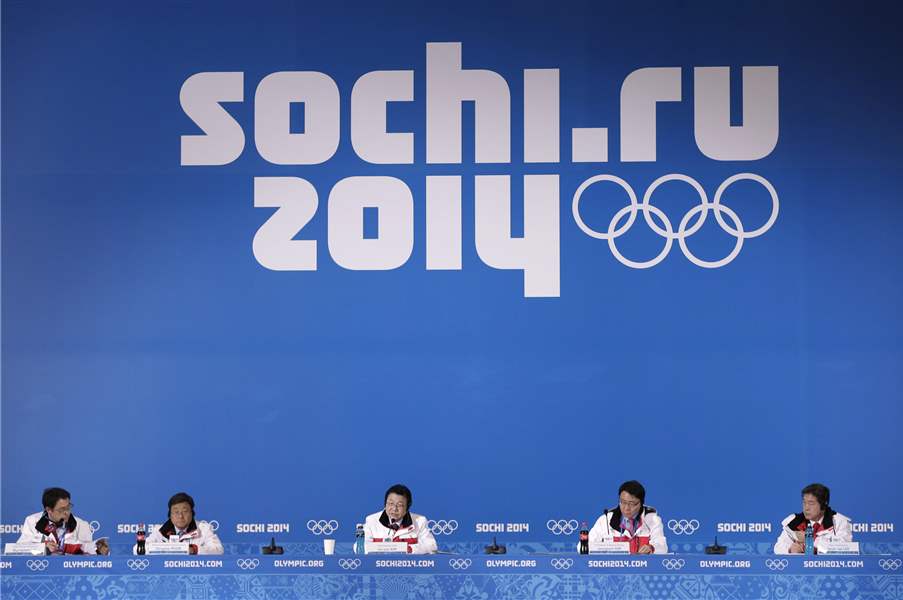
Ready for the baton change, Pyeongchang 2018 organizers set to offer Korean take on Olympics
2/22/2014
A delegation from the 2018 Pyeongchang Olympic Winter Games attend a press conference Saturday in Sochi, Russia.
ASSOCIATED PRESS

A delegation from the 2018 Pyeongchang Olympic Winter Games attend a press conference Saturday in Sochi, Russia.
SOCHI, Russia — Even before the Sochi Games come to a close, organizers of the next Winter Olympics are promising to do them Gangwon style.
After two failed bids to host the Winter Games, the South Korean city of Pyeongchang won the right to stage the 2018 edition in the mountains of Gangwon province east of Seoul.
Organizing committee president Kim Jin-sun held a news conference Saturday to provide an update on preparations and to answer questions about issues including security, North Korea’s participation and whether NHL players would compete in the Olympic hockey tournament.
“Tomorrow the Sochi Games will be closed and the Olympic flag will be handed over to Pyeongchang,” Kim said. “That’s the moment the Pyeongchang Games essentially begin”
It has become a tradition for the current and next Olympic host cities to complete a symbolic exchange of the baton during the closing ceremony. From his side, handover ceremony executive director Yoon Ho-jin is promising the Pyeongchang segment will “showcase Korea’s unique artistry and culture in a global format” in a show featuring “world renowned cast members” on Sunday.
Could that mean PSY performing Gangnam Style in Sochi? They’re not saying.
What the Korean organizers were willing to discuss is planning and construction for 2018, with Kim saying they’re moving “in the right direction for all functional areas.”
Russian organizers were heavily criticized for a budget that reached a reported $51 billion due to costs associated with building almost all the venues and infrastructure from scratch. The 2014 organizing committee also attracted criticism for the late delivery of many official hotels and because the weather — not surprisingly for a Black Sea coastal resort — was a touch warm for the Winter Games.
The Pyeongchang committee said many of its venues in the ski resort area were already built and the cost of staging the games would be around $2 billion, plus $7 billion for infrastructure — more than half of which is expected to pay for a high-speed rail line that should cut the commute to one hour between the capital and the Olympic host city.
Adding to the cost in Russia was a massive security operation, with authorities deploying more than 50,000 police and soldiers amid threats from Muslim insurgents.
Security will be intense for the 2018 Games, too, given the fact Pyeongchang is located near the demilitarized zone that separates the two Koreas. The province itself was divided between North and South Korean after the 1950-53 Korean War.
But Pyeongchang organizers are confident the games will promote peace and hope North Korean athletes — absent at Sochi —will compete in 2018.
“I know North Korea has some winter sport facilities and interest is growing in these sports,” Kim said. “I hope winter sports will develop in North Korea and four years from now North Korean athletes will be able to come. If that happens, it will be a very good thing.”
South Korea hosted the Summer Olympics in 1988, and Pyeongchang organizers want to promote the rapid economic development in their country in the years since.
“Thirty years ago, the world saw a developing country,” Kim said. “Just one generation later, the world will see a truly developed Korea through these games.”